Authors:
Historic Era: Era 10: Contemporary United States (1968 to the present)
Historic Theme:
Subject:
February 1990 | Volume 41, Issue 1
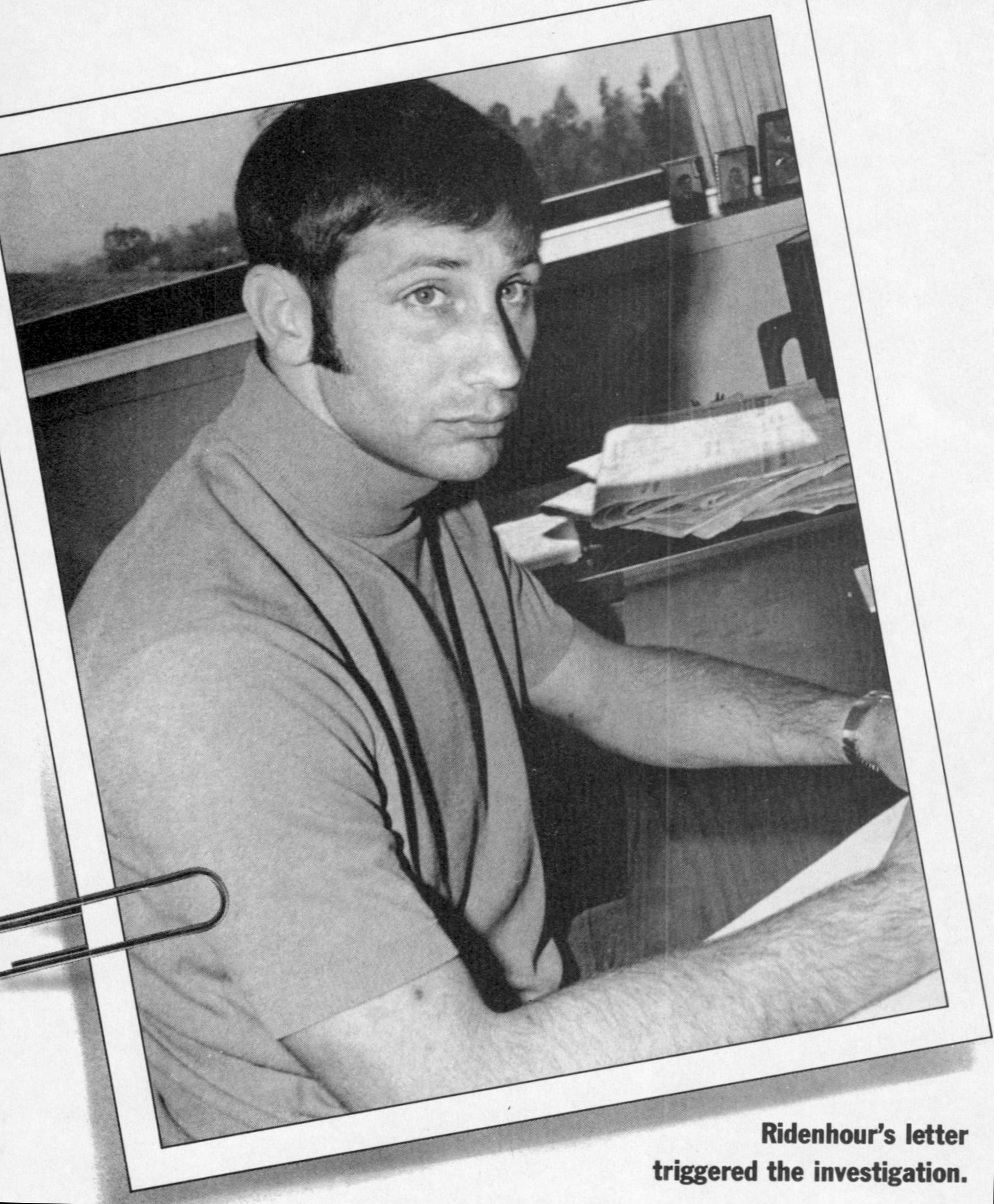
Authors: William Wilson
Historic Era: Era 10: Contemporary United States (1968 to the present)
Historic Theme:
Subject:
February 1990 | Volume 41, Issue 1

In the early spring of 1969, I was an Army colonel recently assigned to the office of the inspector general in Washington, and I was not particularly happy about it; I have always disliked living in Washington, and I think that most infantry officers would rather serve with troops than investigate allegations about irregularities in procurement, which was most of what the IG’s D.C. office did. Our job was to look into complaints sent to us from the Executive Branch or the Congress, and seven or eight fresh ones circulated in each morning’s Read File. When the file came around one morning in March, it contained a lengthy letter from an ex-serviceman named Ron Ridenhour; he had sent copies to the president, 23 members of Congress, the Secretaries of State and Defense, the Secretary of the Army, and the chairman of the Joint Chiefs of Staff. General William Westmoreland had forwarded a copy to our office with orders to investigate. Ridenhour’s letter began:

“It was late in April 1968 that I first heard of ‘Pinkville’ and what allegedly happened there. I received that first report with some skepticism, but in the following months I was to hear stories from such a wide variety of people that it became impossible for me to disbelieve that something rather dark and bloody did indeed occur sometime in March 1968 in a village called ‘Pinkville’ in the Republic of Vietnam.
“One morning in the latter part of March,” he continued, “Task Force Barker moved out from its firebase headed for ‘Pinkville.’ Its mission: to destroy the trouble spot and all of its inhabitants...the other two companies that made up the task force cordoned off the village so that ‘Charlie Company’ could move through to destroy the structures and kill the inhabitants...one of the company’s officers, 2nd Lieutenant Kally [Calley], rounded up several groups of villagers (each group consisting of a minimum of 20 persons of both sexes and all ages)....Kally then machine-gunned each group. It was so bad that one of the men in the squad shot himself in the foot in order to be medivac-ed out of the area so he would not have to participate in the slaughter....”
See also “First Blood In Vietnam,” by Stanley Karnow
I read the letter in shocked disbelief and disgust as it continued in precise, revolting detail for five pages. One description particularly sickened me; Ridenhour depicted a three-or four-year-old boy “clutching his wounded arm while blood trickled between his fingers....He just stood there with big eyes, staring around like he didn’t understand....Then, the captain’s RTO [radio-telephone operator] put a burst of 16 [M-16] fire into him.”
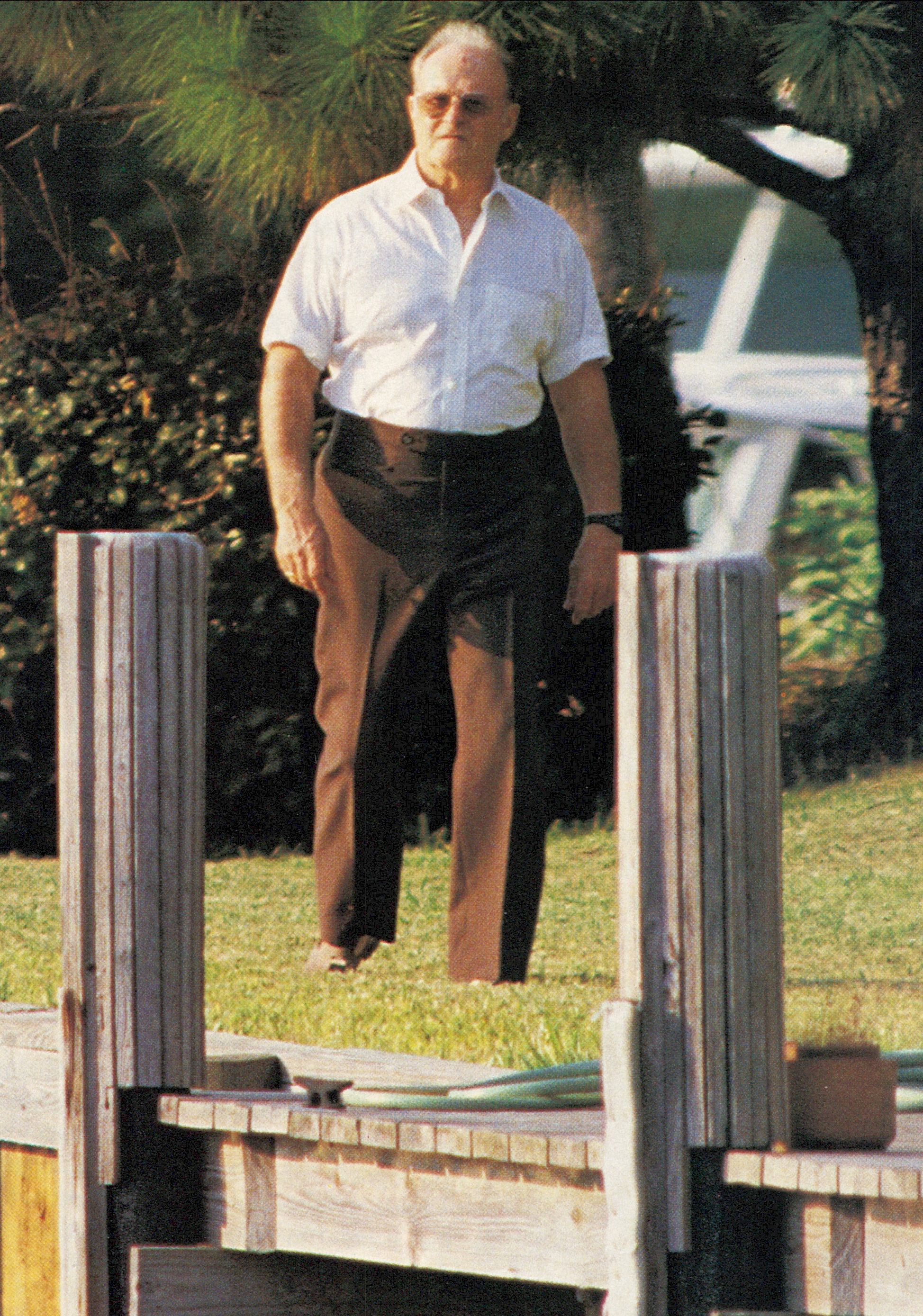
After reading the letter four times, I picked up the phone for an appointment with Major General William Enemark, the inspector general. His secretary said I could see him at 10:00. I read the letter again and waited. I remember insisting to myself that this was only hearsay; Ridenhour himself had noted that. I remember thinking that this could not be true. At ten, I entered General Enemark’s office, saluted, and explained that I had asked to see him regarding the letter from Ridenhour.
The general observed that it painted a sordid picture of our forces, and added that General Westmoreland and several congressmen were very upset. I requested assignment to the case, pointing out that I was the only investigator he had with infantry combat experience; I had served with the 101st Airborne in World War II. In my time, I’d seen civilians killed, but those deaths had been accidental, and I thought it important to have someone who was confident that he could separate atrocities from wartime incidents requiring lethal force; our bombers, of course, killed women and children every day. But, if the Pinkville incident was true, it was cold-blooded murder. I hoped to God it was false, but if it wasn’t, I wanted the bastards exposed for what they’d done.
General Enemark rose from his chair, walked to the window, and stared at the busy Washington traffic passing in front of the Forrestal Building. After a while, he said that he agreed that the investigation needed an officer with combat experience. He cautioned me that, if he gave me the job, I would have to keep an open mind, and urged me to remember that everything in that letter was hearsay. He wanted me to move fast; if the information leaked before we got the facts, it would do a lot of damage to any subsequent disciplinary actions.
I assured the general that I would work as hard to disprove as to prove the allegations. He said that he’d give me his decision that afternoon, picked up his phone, and nodded that the discussion was over; I saluted and returned to my office.
The general approved my request in writing with a letter of instructions that included a requirement to keep the investigation and the disclosures confidential until I had completed the case and told him my conclusions. I conferred with my division chief, and he assigned a court reporter for the case. Smitty was near retirement, a cheerful D.C. local and pretty good company; that was very good luck because it turned out we were going to spend the next three months living cheek by jowl in motels. An investigator from the IG’s office spends the bulk of his time interviewing witnesses, and our interrogations are sworn testimony taken down verbatim by the accompanying court reporter.
It helps if you can follow what the witnesses are talking about. I made a hasty study of available
I obtained a roster of C Company, 1/20th Infantry Regiment, the company that Ridenhour had described, as it had existed on March 16, 1968, and requested Army Locator Files to provide the present addresses of the men on the roster. Then, I called Army Map Service and arranged for topographic maps of the Quang Ngai area and went to my desk to think. I looked at Ridenhour’s letter again; he had mentioned seven names. The information in the letter originated with four of these men, and the first step was obviously to interrogate Ridenhour, then find the four men who’d provided the information.
In the best of all worlds, Ridenhour would turn out to be crazy, but the tone of his letter—eloquent, thorough, and absolutely convincing—didn’t leave much hope of that. What hope there was resided in the fact that the entire letter was hearsay. With luck, the information would be garbled, exaggerated, or just plain wrong; that would be determined by my interviewing as many of the men who had actually been there as I could still find. The letter, dated March 29, 1969, indicated that Ridenhour was in Phoenix. I needed details and addresses. Perhaps he knew the location of his four buddies. I kept repeating to myself: This is not a criminal investigation, there is no cross-examination, you are not trying to convict anyone, only to determine the facts.
There was no problem locating Ridenhour; I picked up the telephone and dialed Phoenix information. Ridenhour knew the location of the men who had told him of the atrocity: Charles Gruver was in Oklahoma City; Michael Terry was in Orem, Utah; Sp4 William Doherty was at Fort Hood, Texas; and Sgt. Michael Bernhardt was at Fort Dix, New Jersey. Army records indicated that Sgt. Lawrence LaCroix, another of Ridenhour’s informants, was at Fort
An investigator from the Department of the Army inspector general’s office does not have subpoena powers. While military witnesses can be ordered to appear before the IG investigator, civilians may or may not cooperate. I was relieved that all the men seemed eager to assist when I spoke with them on the phone; I told them that I’d contact them on my arrival. Meanwhile, I dissected Ridenhour’s letter to extract the specific allegations and establish the routine questions to begin interrogations. I decided to inform the witnesses that the investigation had been ordered by General Westmoreland, because these men had served under him, and it was my impression that most soldiers had a great deal of confidence in Westmoreland. I also decided to wear full uniform and decorations to reveal immediately that they were talking to a combat soldier. Several of the men said that, if I hadn’t been wearing the Purple Heart—I’d been wounded at Normandy—and combat infantry badge, the information they gave me might have been different. In my experience, those are two awards a combat infantryman recognizes and respects.
We were trained in the IG school on investigative procedures, administering oaths, and legal restraints on interrogations, but this seemed to be a particularly tricky case. I conferred with the division chief and Colonel Clement Carney, the IG’s judge advocate officer (military attorney), about pre-interrogation warnings. We decided not to use them; this was not a criminal investigation, but one designed to determine the facts. Warning a witness at the beginning of the questioning that anything he said might be held against him would defeat the effort. I would not be placing the witness in jeopardy because, if he did incriminate himself, the testimony could not be used, as warnings were not given. This was to become extremely important. Each witness was told not to disclose or discuss his interrogation because of the damage it would do to any subsequent legal actions, although, once I was on the road, I got the impression that a number of the men had put out the word that I was coming and had given their buddies a sense of what sort of person I seemed to be.
I set out for Arizona with mixed feelings about my chances. Ridenhour’s letter was dated March 29, 1969, one year and 13 days after the My Lai assault. General Westmoreland’s office had acknowledged receipt to Ridenhour on April 12, stating that an investigation was underway; Westmoreland had officially turned the case over to the inspector general on April 23, and I was about to interview Ridenhour in Phoenix on the 29th, one month to the day after the date of
Ridenhour’s interrogation was conducted at night, as were the majority of the interviews; most of the men worked or went to school by day. At 45, I was older than almost all of them. Ridenhour and I met in a downtown Phoenix hotel and went over his letter until I had assured myself that my questions to the witnesses would cover all the allegations. He was an extremely impressive young man, and, while his allegations were still only hearsay, he was depressingly convincing. The fact that he had stuck with it, pieced the thing together, and followed through remains extraordinary. Smitty and I left Phoenix the next morning for Orem, Utah to interview Michael Terry on the first of May. I read to him his statement in Ridenhour’s letter: “Most of the people they came to were already dead....The platoon left nothing alive, neither livestock or people...Close to us was a group of Vietnamese in a heap and some of them were moaning. Calley [2d Lt. William Calley] had been through before us and all of them had been shot, but many weren’t dead...It was obvious they weren’t going to get any medical attention....I guess we sort of finished them off.”
Terry acknowledged that this was the information he had given Ridenhour. While this was an ugly incident and a grievous error, I had no doubt that Terry had tried to put these people out of their misery.
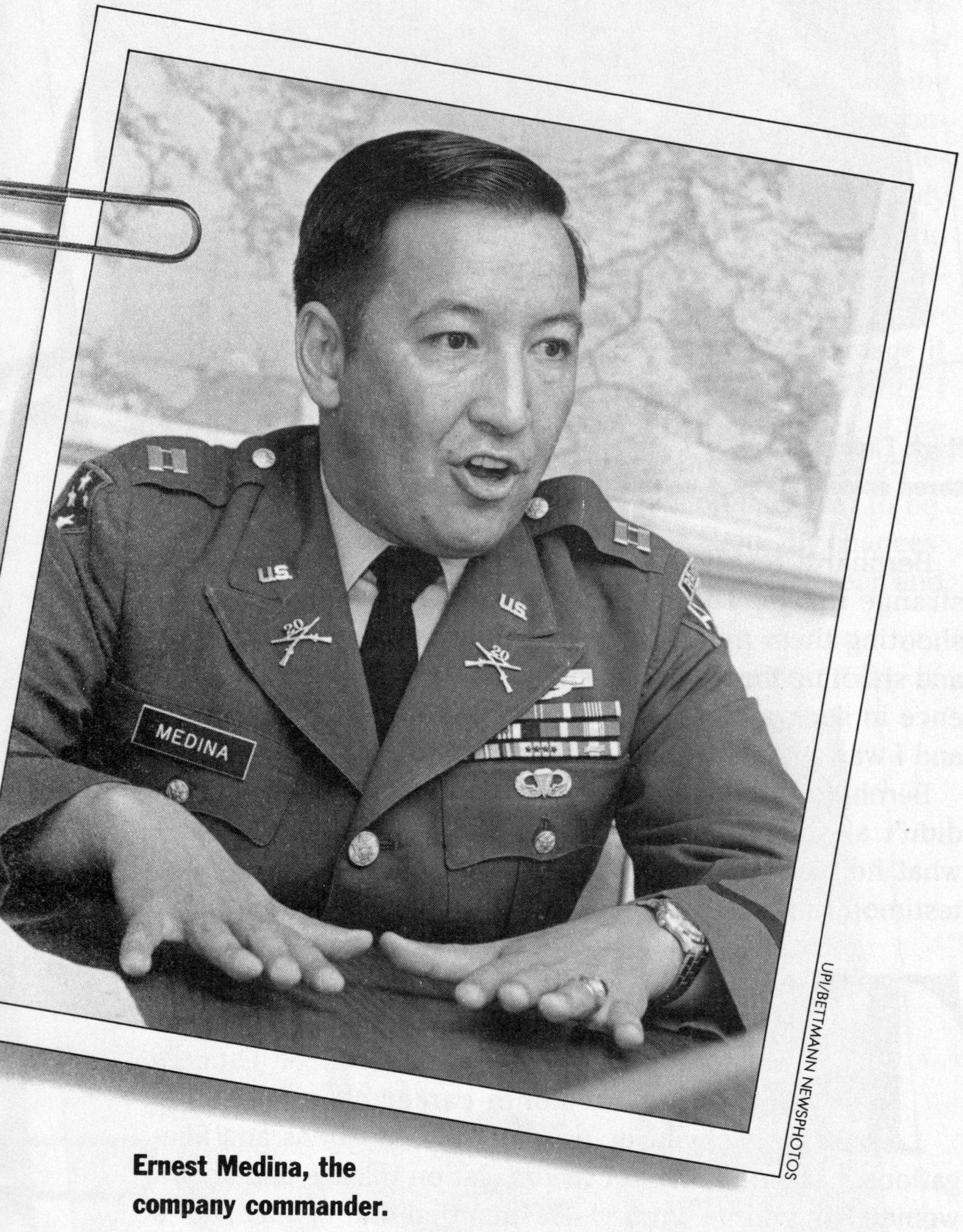
We left Orem for Fort Carson, Colorado, where I interviewed Sergeant Lawrence LaCroix on May 2. Ridenhour had talked to him in June 1968 at the USO in Chu Lai; he had claimed to have witnessed Calley’s gunning down at least three separate groups of villagers: “The people in the groups were men, women and children of all ages. As soon as he felt that the group was big enough, Calley ordered an M-60 [machine gun] set up and the people killed....When the first group was put together, Calley ordered PFC Torrez...to open fire on the villagers....This Torrez did, but before everyone in the group was down, he ceased fire and refused to fire again....Lieutenant Calley took over the M-60 and finished shooting the remaining villagers....Calley didn’t bother to order anyone to take the machine-gun when the other two groups of villagers were formed. He simply manned it himself and shot down all villagers in both groups.”
LaCroix said that this statement was correct and also testified that, at some point during the morning, someone in a helicopter complained over the radio, “From up here, it looks like a blood bath. What the hell are you doing down there?”
If there had been such a person, it was someone we had to track down; subsequent interrogations produced the name of
Smitty and I caught an early flight for Oklahoma City and interrogated Charles Gruver on May 3; the contacts were moving as planned. I called the Washington office and told them to order Sergeant Michael Bernhardt, stationed at Fort Dix, to report to me on May 8 at the inspector general’s office in Washington.
Gruver said he had indeed seen the three- or four-year-old wounded boy machine-gunned by the radio operator; the information he had given Ridenhour concerning Calley was hearsay, but he trusted the people who’d told him.
Our flight from Oklahoma City was late, so I did not interview Sp4 William Doherty at Fort Hood till the fifth of May. Doherty had been with Michael Terry when they entered My Lai 4 after the initial assault, and he confirmed that nearly every living thing in the village had been shot: cows, chickens, dogs, babies, and unarmed women. A lot of the people had been murdered in, or shot and subsequently dragged to, a drainage ditch. This made just too many witnesses for the tale of mass murders to have been conjured up out of whole cloth; a repugnant picture was forming in my mind, and I could see that Smitty was depressed, too. Smitty was a quiet man, but his emotions were evident in his actions and expressions. When witnesses described the alleged murders, he lost his appetite and sometimes stared expressionlessly out into space. I normally tried to read the testimony of previous witnesses prior to new interviews, but with our schedule of packing, traveling, and interrogating as a daily, repetitive routine, this was impossible. Transcribing testimony is not something done hurriedly, and Smitty had no time. We returned to Washington on the sixth, and Smitty’s transcription of the mounting testimony was backing up. By this stage, I was using maps to have the men plot what they could remember.
I interrogated Sergeant Bernhardt on the eighth. By that time, I had the names of 60 to 70 percent of the men from C Company. Ridenhour’s letter had described Sergeant Bernhardt’s actions at My Lai 4: “...Bernie had absolutely refused to take part in the massacre...He thought it was rather strange that the officers of the company had not made an issue of it.”
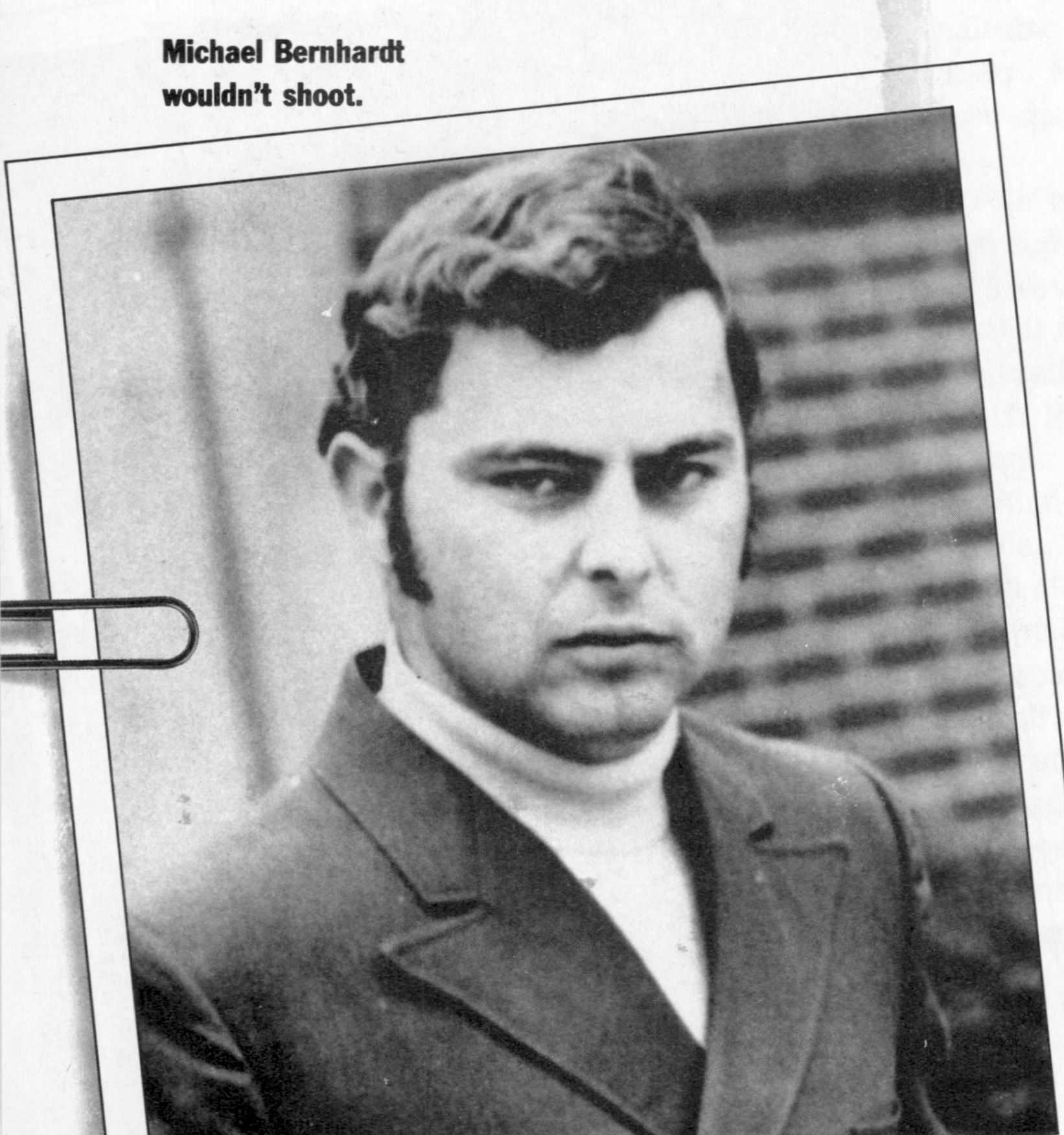
Bernhardt said this was true. He had entered the village after the action had started because Captain Ernest Medina had sent him to the landing zone to check a booby trap. He summarized the day: “We met no resistance and I only saw three captured weapons. We had no casualties. It was just like any other Vietnamese village—old papa-sans, women, and kids.
Bernhardt testified that he saw Charlie Company doing strange things. The troops were going into hooches and shooting them up. They were gathering people in groups and shooting them. He was still astonished by his very presence in such a place that day: “It was point-blank murder, and I was standing there watching it.”
Bernhardt was an extremely cooperative witness, but he didn’t always distinguish between what he had seen and what he had heard; under close questioning, a lot of his testimony amounted to hearsay.
There was a key witness in Georgia, Captain Ernest Medina, the C Company commander, who was attending the Infantry Advanced Officers School, a nine-month career course. Medina was obviously upset by the questions and allegations. I asked him about the allegation that he had shot a woman lying on the ground. He admitted that he had shot a body that he assumed was dead, but, when he turned to walk away, he thought he saw, from the corner of his eye, the woman’s hand moving under her body. He fired because he thought she might have been preparing to throw a grenade. I believed Medina; he seemed to be a pretty sharp officer, he was planning a life in the service, he loved the Army, and he seemed very far from being a monster.
What had this force been attempting to do? I notified the Washington office to summon Major Charles Calhoun from Fort Monroe, Virginia for interrogation at the Forrestal Building on May 19. He had been the operations officer for Task Force Barker, and he summarized the plan of attack: “...the main force of the 48th Battalion was again back in this area [Son My Village]....Colonel [Frank A.] Barker decided he wanted to land as close to the village...as fast as he possibly could to take advantage of surprise, and so forth....Generally, he was thinking of landing near My Lai 4 with a rifle company [C Company]...and then taking another company and landing in behind for a real fast advance into the ‘Pinkville’ area proper [My Lai 1] to see if we could catch the headquarters before it moved, as had happened on other operations.”
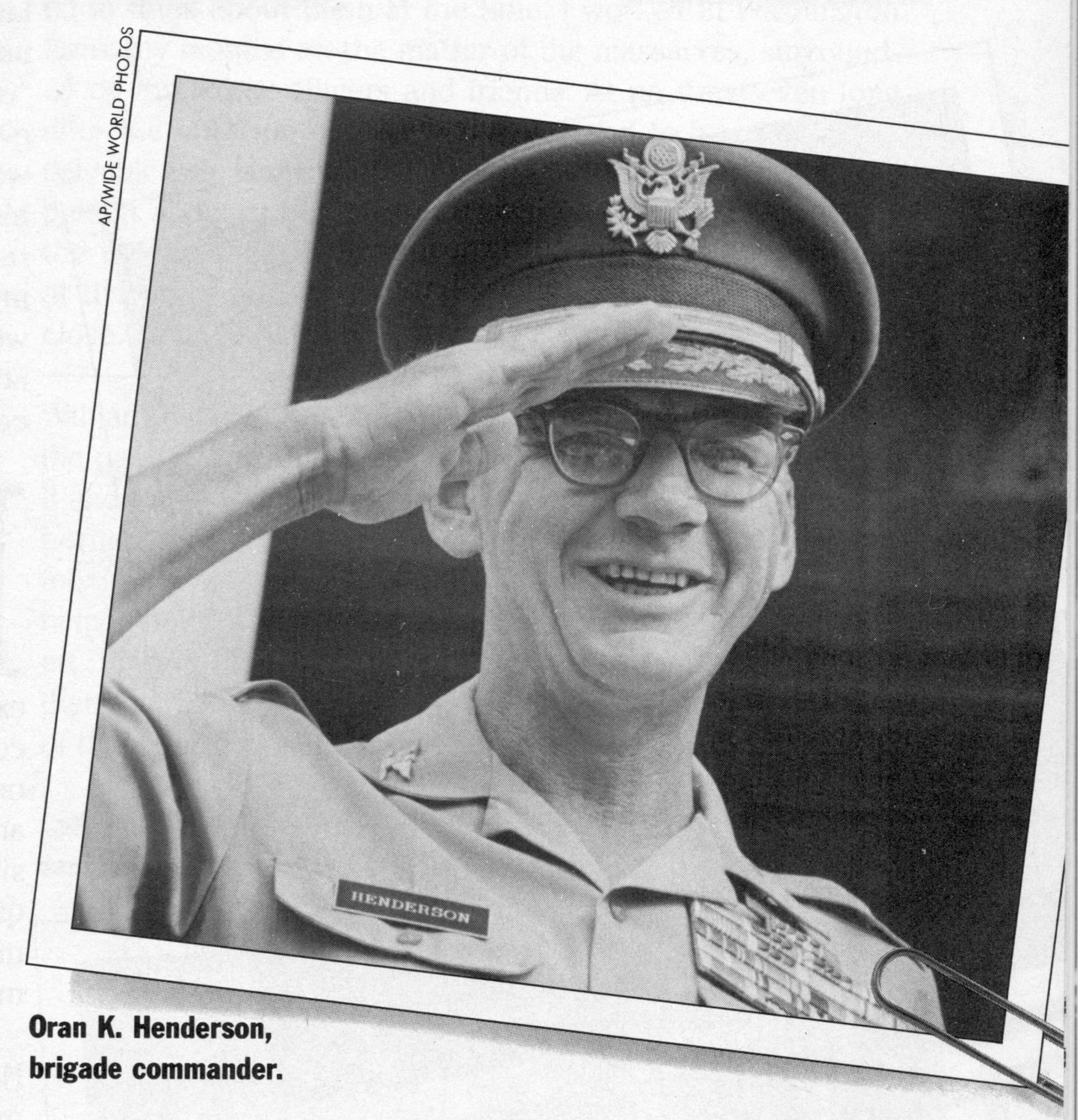
Colonel Oran K. Henderson had assumed command of the brigade immediately before the massacre; he was ordered to report to the inspector general’s office on May 26 from U.S. Army headquarters in Hawaii. I asked him to sketch on my map the Son My operation as he remembered it. He denied being told anything about his troops wantonly killing large groups of civilians, and he denied a machine-gun confrontation between Thompson, the man in the helicopter, and CaIley. He did remember Thompson telling him that his soldiers
Calley’s platoon seemed to be the centerpiece of whatever had gone horribly wrong. I had interrogated SFC Isaiah Cowan at Fort Jackson, South Carolina on May 23. he was Calley’s platoon sergeant. The two had argued bitterly about tactics and procedures, Cowan said, but “Calley was my superior officer and I had to follow him, whether I liked it or not...You have to go with your officers.”
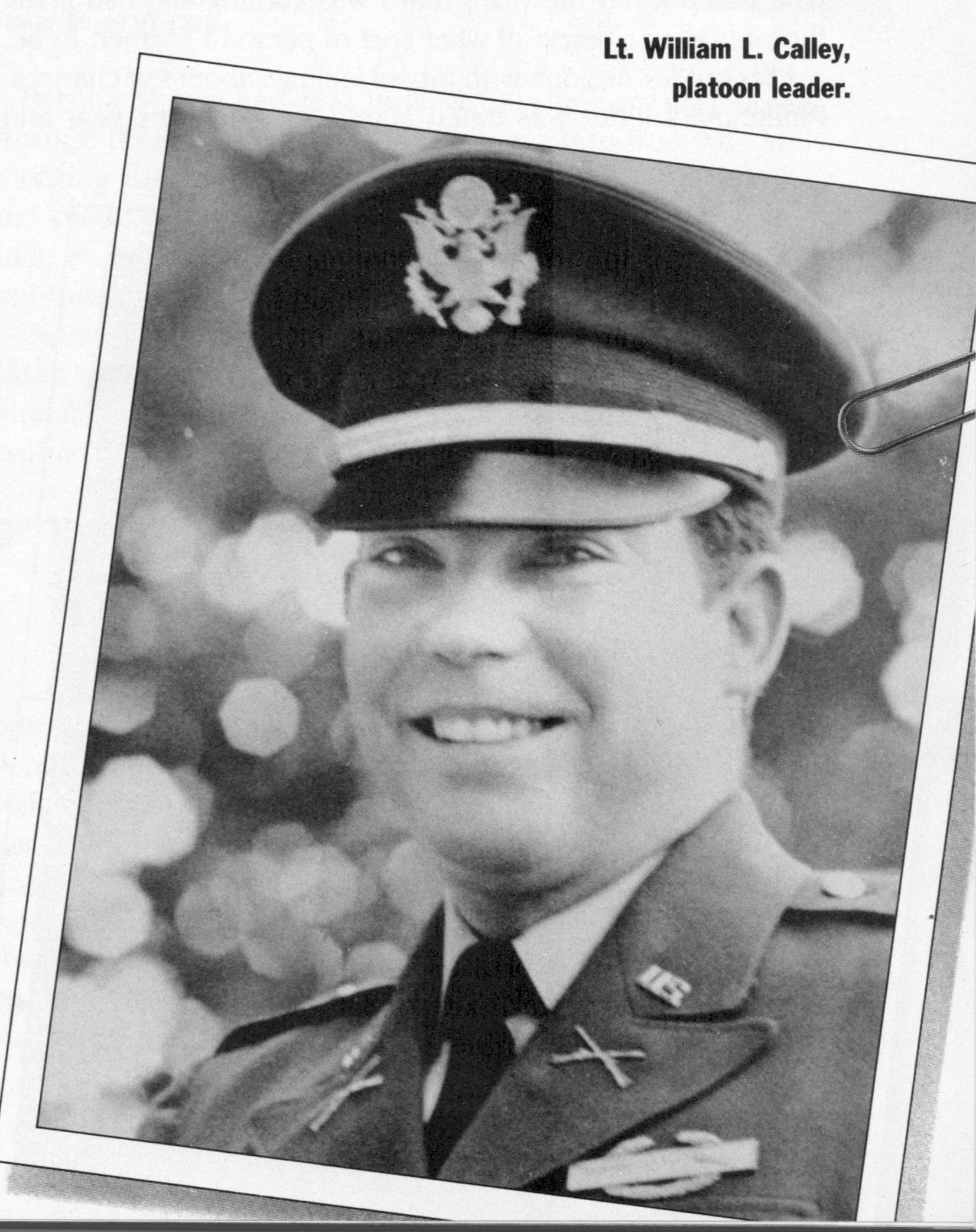
William L. Calley, Jr., had flunked out of Miami’s Palm Beach Junior College in 1963. He’d moved west and worked for several years before enlisting in the Army in 1966. Despite a poor academic record, he was selected for officer candidate school and graduated without learning to read a map properly. The consensus in the platoon boiled down to a single question: How had the Army ever considered Calley officer material? When I later interrogated Roy L. A. Wood in Richmond, Virginia—a rifleman in Calley’s platoon—he said, “I wonder how he got through officer candidate school. He couldn’t read no darn map, and a compass would confuse his ass.” I made arrangements for Calley to be returned to the United States from Vietnam and report to the inspector general’s office on June 9.
Meanwhile, the Army found CW2 Hugh C. Thompson, Jr., and issued special orders for him to report to me on June 11 from Fort Rucker, Alabama. I kept him in Washington for three days while he tried to accomplish, on the spot, what Ridenhour had done a year earlier: He attempted to reconstruct the entire incident. He was not entirely successful—and I do not think any honest eyewitness could have been—but he made prodigious efforts. He said that, as he flew over the hamlet in his helicopter, he began seeing wounded and dead Vietnamese civilians everywhere. He decided to mark the location of wounded civilians with smoke so the GIs could start treating them. “The first one I marked was a girl that was wounded,” Thompson testified, “and they came over to her, put their weapon on automatic and let her have it.”
Thompson landed his helicopter near a drainage ditch filled with corpses. Nearby, he saw several terrified women and children cowering in a bunker. An
Thompson had not been assigned to C Company; he was an outsider. I needed him to identify Calley—if Calley was indeed the man he had seen performing these acts—and I arranged for a line-up. I was nervous about prompting a witness, and I took some pains to explain to Thompson that all that we were trying to do was establish if one of these individuals was one of the people he’d talked to, and that his identification might do as much to clear an individual as it would to accuse someone of having been present.
The next morning, June 13, Thompson picked out Calley from a line-up, identifying him as the officer at the drainage ditch in My Lai 4. Thompson also reported seeing a captain shoot a woman at close range while she lay on the ground. Without identifying Medina, I repeated his testimony about the movement of the woman’s hand. Thompson said that “nothing is impossible.” Thompson testified that he spent 20-30 minutes the following day giving Colonel Henderson his account of the massacre at My Lai 4. “I told him I had seen the captain shoot the Vietnamese girl. I told him about the ditches and the bodies in the ditch....I told him how I had gotten the people out of the bunker. I told him what I said to the lieutenant.”
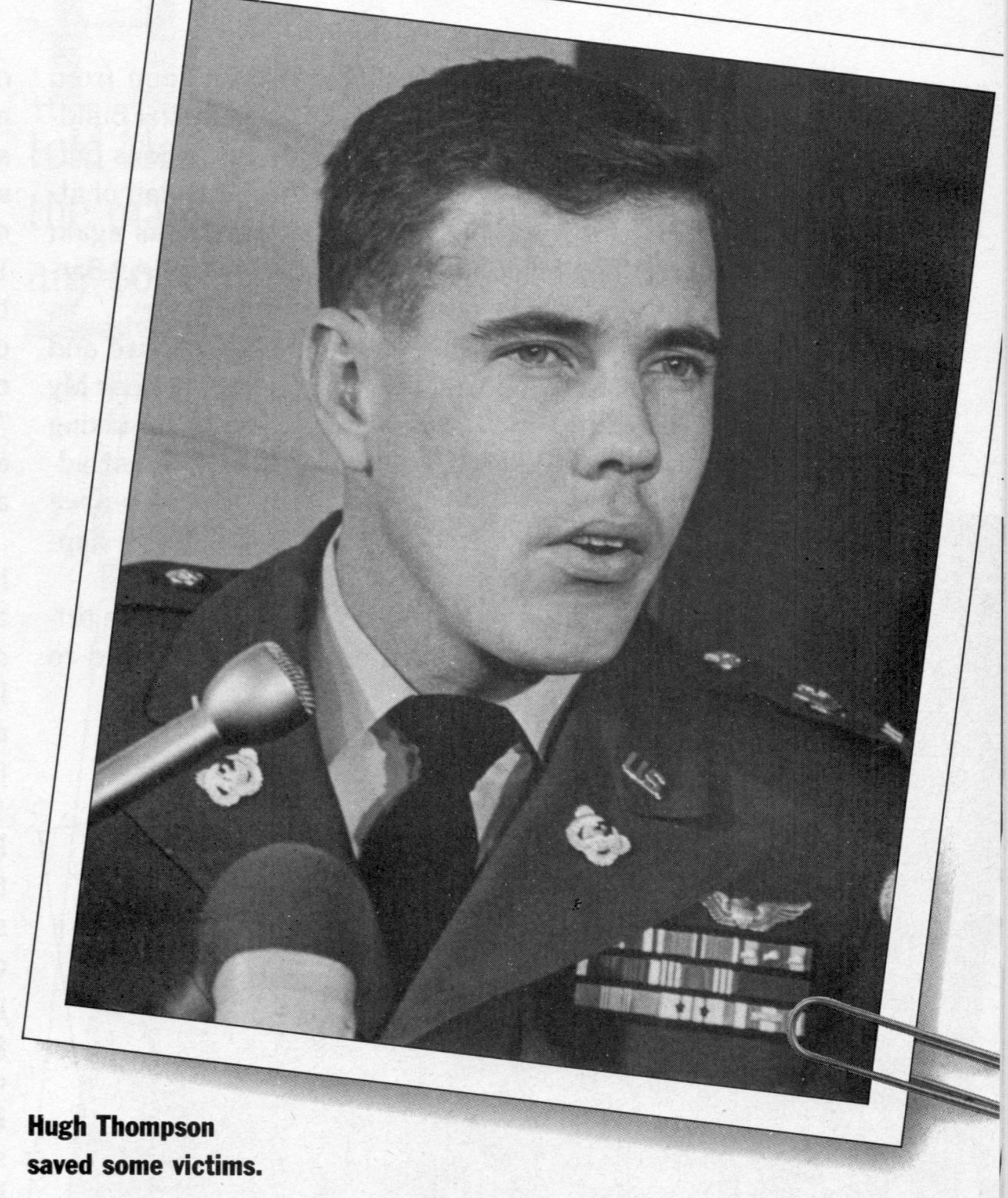
Thompson estimated the number of bodies in the ditch at between 75 and 100. I found Thompson immensely impressive; he was the only hero of that awful day, and his testimony was damning. The trick would be to corroborate it.
This got easier when I found CW2 Dan R. Mullians at Fort Walters, Texas, and cut special orders for him to report to me in Washington on June 18. Mullians had been flying a helicopter in support of Charlie Company that morning, had heard no shooting, and received no fire. He noticed the numerous bodies scattered in and around the village - in particular, the ditch with bodies piled five to six feet deep. He stated that Thompson was enraged, and he had heard him say over the radio that “if he saw the ground troops kill one more woman or child, he would start shooting [the ground troops] himself.”
Then we had PFC Lawrence M. Colburn, Thompson’s door gunner, brought to Washington from Fort Hood on June 19. He also confirmed Thompson’s testimony. I showed him a number of photographs, and he picked out Medina and Calley as the officers involved in
The boy, clinging desperately, was pried loose. Thompson said, “I don’t think he was even wounded at all, just down there among all the other bodies, and he was terrified.” Thompson and his men flew the baby to safety.
Major Glen D. Gibson, Thompson’s company commander, was located at Headquarters 6th U.S. Army and was ordered to report to Washington on June 25. There was a conflict between his and Colonel Henderson’s testimony; Henderson had testified that, sometime that evening, he asked Major Gibson, the commander of Thompson’s aviation company, to look into this matter of his gunships threatening American soldiers, and also whether the crews had observed “any of my soldiers shooting at civilians.” Henderson stated that Gibson reported that “none of them had heard or seen any indiscriminate shooting, nor had they participated in any. He got a complete negative response from his people.” Gibson persistently denied having any conversations with Henderson about My Lai 4.
The next step was to talk with more of Calley’s people who had been on the ground. Ronald D. Grzesik was the fire-team leader in Calley’s platoon. On June 26 in Springfield, Massachusetts, I questioned him about his orders prior to the attack on My Lai 4. He had heard Medina tell the men “to go in and destroy the village; to make it uninhabitable,” but he did not recall an order to destroy the inhabitants. For Grzesik, My Lai 4 was the end of a vicious circle that had begun months earlier: “It was like going from one step to another worse one....First, you’d stop the people, question them, and let them go. Second, you’d stop the people, beat up an old man, and let them go. Third, you’d stop the people, beat up an old man, and then shoot him. Fourth, you’d go in and wipe out a village.”
While Grzesik was closing in on the village with his team, he was told to go to Calley. He walked over, and Calley ordered him to go to the ditch and “finish off the people.” Grzesik refused, Calley asked him again, and Grzesik again refused. “I really believe he expected me to do it,” Grzesik said
I was struck by the picture of this man Meadlo, crying by the bodies of the dead; he was possibly the crucial witness, the last man I needed to present the truth of My Lai. Further interrogation disclosed that Meadlo had lost his foot to a land mine the following day. While being loaded on the evacuation helicopter, he shook his fist at Calley and screamed, “God will punish you for what you made me do!” He was evacuated and discharged from the service. That meant he would remember the day as no other man would, because his account of the activities would not be influenced by barracks-room discussions following the massacre. I knew from my own experience that combat troops eventually come up with an agreed-upon version of violent and dramatic events, and men defer to the authority of an account they have unconsciously collaborated on. So, Meadlo was the one.
I worked my way around the country. I interviewed Dennis R. Vazquez (formerly a captain) on July 1, in Wiliamsburg, Virginia. He was the task-force artillery liaison officer and testified that his forward observer reported 69 Vietcong killed by artillery. To an experienced soldier, this had been a remarkably high body count for a 3-5-minute artillery barrage. I moved on to interrogate witnesses in Fort Worth, Texas on July 9 and in Uvalde, Texas shortly afterward, and then in New Kensington, Pennsylvania, on July 15. I focused on a series of questions concerning Meadlo; I wanted confirmation of his remorse and his actions after the alleged atrocities. He became more important with each witness.
The evening of the 16th of July in a motel in Terre Haute, Indiana is a time I would like to block from my memory. Paul D. Meadlo, his right foot and self-respect gone, came to the motel determined to relieve his conscience and describe the horrors of My Lai. He stated that Calley had left him and a few others with the responsibility of guarding a group of about 80 people who had been taken from their homes and herded together. He repeated Calley’s instructions. “You know what I want to do with them,” Calley said, and walked off. Ten minutes later, he returned and asked, “Haven’t you got rid of them yet? I want them dead. Waste them!” After telling about this, Meadlo raised his eyes to the ceiling of the motel room and began to cry. His compassion for the victims had taken control of him months before, and his body shook
I was shocked. He blurted this confession out immediately after I asked him to tell me what happened at My Lai. I stopped him and told him to wait outside the room with Smitty. I called Washington, contacted Colonel Carney at home, and told him that a witness had confessed to murder and I had not warned him of his rights. Colonel Carney instructed me to give Meadlo his warnings and see if he would repeat the confession. After he was warned that anything he said could be held against him in a court of law, he said, “I don’t care.” He repeated his confession.
I decided that the case was closed.
There was no doubt in my mind that a massacre had been committed at My Lai 4. Something in me had died as I watched Meadlo regress to the revulsion of the massacre at My Lai on March 16, 1968. I had prayed to God that this thing was fiction, and I knew now that it was fact. I returned to Washington to report my findings on July 17, ten weeks after I had first interviewed Ridenhour. The report was to go to the chief of staff, the president, and Lt. Gen. William R. Peers. On August 19, I flew to Fort Benning to brief the legal officers there about the case. Under Army regulations, the commanding officer of Fort Benning and his legal staff were the ultimate authority for reviewing the evidence and filing charges against Calley.
On November 26, 1969, the Secretary of the Army and the chief of staff issued a joint memorandum directing General Peers to explore the nature and scope of the original Army investigations of what had occurred in Son My village. The Peers inquiry was neither to include nor to interfere with the criminal investigation in progress.
Over my strong objections, I was ordered to participate in the inquiry; I stated, to no avail, that four months of this nightmare was enough. It was decided early that, in order to discover the extent of the cover-up, the investigation must determine what had occurred in the entire Son My area on March 16 and 17, 1968. The Peers inquiry discovered that an equally vicious massacre that had been conducted by a second company (Bravo) of Task Force Barker on the same day. In Co Luy, a mile or so from Tu Cung (My Lai), 97 civilians were murdered. We reported that the crimes visited on the inhabitants of Son My village included individual and group acts of murder, rape, sodomy, maiming, assault on non-combatants, and the mistreatment and killing of detainees. Murders were common, as was discovered by the inspector general, the Peers inquiry, and the Criminal
As for Calley, he was sentenced to life, which was reduced by the reviewing authority to 20 years and by the Secretary of the Army to 10. In the end, he served less than three years under house arrest, and, today, he is working in his father-in-law’s jewelry store in Columbus, Georgia.
I never made any particular effort to keep track of the witnesses from Charlie Company, but, somehow, you hear this or that, and, sometimes, it sticks. Meadlo is in Terre Haute, Indiana; he had trouble finding work with a foot blown off, but he eventually got a factory job making plastic film. I think he was laid off in November of 1988. Ridenhour became a writer; he now works for City Business in New Orleans, and, in March 1988, he won the George Polk Award for local reporting after he’d ferreted out a lot of graft in the city government.
Mostly, though, I am struck by how few of these events I can or even wish to remember and how little any of us wanted to think about them at the time. I worked in Washington for many months on the matter of the massacres, surrounded by my fellow officers and friends. At no time, even long after the question of security had ceased to be of any conceivable relevance, do I remember ever talking to a single person about any of it. I do remember being startled when the public seemed to make a hero out of Rusty Calley, or at the least a victim. It sure didn’t look that way from up close.
